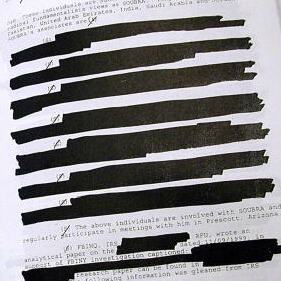************** THIS IS A RUSH, UNCORRECTED TRANSCRIPT ****************
BROOKE: Though some condemn the drone program for being opaque, President Obama, in his public apology last week, argued quite the opposite:
[CLIP]
OBAMA: Even as certain aspects of our national security efforts have to remain secret to succeed, the United States is a democracy, committed to openness, in good times and in bad.
But the Associated Press begs to differ. The AP reviewed the government’s data for 2014, and found that as Freedom of Information Act requests increased the Obama Administration set new records for denying, censoring, or ignoring them. Kathleen Carroll is the AP’s Senior Vice President and Executive Editor. She told us that a few months ago the treasury department sent the AP 237 pages in its latest response to a request on Iran trade sanctions. And they were nearly all completely blacked out.
CARROLL: I think a real profit center for a local business in Washington would be to have the black ink market. We get lots and lots of pieces of paper that have been just inked across every single line. That's a very time consuming process. It would seem to be much easier just to give us what we ask for.
BROOKE; What reason did they give you for blacking out all those pages on your request regarding Iran trade sanctions?
CARROLL: In this case it was that the documents contained trade secrets for businesses that might not want that information made public.
BROOKE: Is that a standard reason for denial?
CARROLL: It's one of several. We also hear national security - that's the largest fluffiest blanket that's thrown across most records. Occasionally we do have a sense that the records are being denied for reasons that this administration in particular are improper. And that is, what's in the information is embarrassing?
BROOKE: Can you give me an example of that?
CARROLL: The first lady gets a lot of attention for her clothing choice, and she is a notable style and fashion icon, and we wanted to know who was paying for it. So we got a lot of records that had that familiar sea of black ink, and one of the reasons that had been cited was that it was not proper information to be released to the public. Yet, one line they forgot to black out was the memo saying that they were scared of the White House and the White House response?
BROOKE: Literally? It said that?
CARROLL: Her shoe size also was blacked out. I just think these explanations are elastic enough that people stretch them to cover whatever their real motivation is. And sometimes their real motivation may be, listen, this is a pain in the backside, so we're gonna say no.
BROOKE: Now this withholding of records doesn't just concern the feds, there are a number of incidents with local and state governments that often involve price gouging, right?
CARROLL: One of the ways they can turn the request away is to demand an exorbitant copying fee, and that happened to us recently in Ferguson, Missouri. The AP like other journalists asked for some material that would help us understand more about police conduct in the past in Ferguson. And in return the town told us that it was going to take them a lot of time to comply with that request and they would do so if they would pay for their time at 135 dollars an hour.
BROOKE: Press access in general seems to be a big problem for this administration, the White House Correspondents Association is currently crafting a kind of protocol to kind of guarantee the press certain rights, and among its principles are the president should take questions from the press no less than once a week. And briefings should be on the record - I mean, are things really that bad?
CARROLL: This is an administration that has pulled more and more of the president's public activities behind closed doors. Such benign public acts as signing bills into law. Now what could be happening in there? Why is that private? People when they are elected to high office shouldn't then go into a cocoon that insulates them from questions form the people they are governing.
BROOKE: But do you really think that the average citizen cares about the administration's record on transparency?
CARROLL: They won't until they need something from the government and then it's denied to them. The laws that we are fighting to keep robust here are the same ones that allow people who are researching their family's genealogy and want their family's military records or social security records. These laws cover those activities as well as our questions about trade sanctions.
BROOKE: Obviously the Obama administration's record on transparency has not been stellar and it's something that we've covered a lot. But I have to ask you, why talk about this again right now?
CARROLL: I think it's important that we keep talking about these issues as the men and women who want to be the next president are on the campaign trail. Reporters are hanging out with them and asking them questions, and average citizens are sharing a cup of coffee with them. And the closer and closer they get to the nomination and then to the White House, the more and more they remove themselves from those encounters, and that's not healthy. These rights belong to the American people. And we're fighting for them not just on behalf of the profession that I'm in, but on behalf of the people who put these public officials into office, and have expectations of them of how they'll conduct themselves once they're there.
BROOKE: Kathleen, thank you very much.
CARROLL: My pleasure, Brooke.
BROOKE: Kathleen Carroll is senior vice president and executive editor of the Associated Press.
